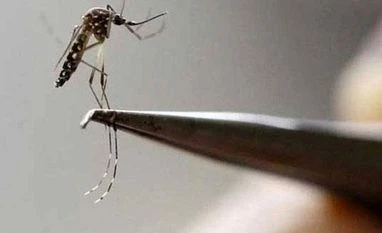The number of dengue-affected people in the capital this season has climbed to 1,185 with over 35 per cent cases of the vector-borne disease recorded last month, according to a municipal report released today.
A 12-year-old boy had succumbed to dengue shock syndrome on August 1 at the Sir Ganga Ram Hospital here, the first death due to the vector-borne disease reported in the city this year.
The number of malaria cases recorded till September 2 has risen to 524, while the figure for chikungunya stands at 392.
Vector-borne diseases are reported between mid-July and November end. Cases of all the three vector-borne diseases were reported much earlier this time, which doctors had attributed to early arrival of the monsoon.
Dengue and chikungunya are caused by aedes agypti mosquito, which breeds in clear water. Anopheles mosquito, which causes malaria, can breed in both fresh and muddy water.
According to the report, breeding of mosquitoes has been reported at 1,38,590 households in Delhi. All the three municipal corporations have stepped up awareness drives -- distributing pamphlets and plying vehicles with loudspeakers issuing dos and don'ts for prevention of the diseases.
The city government has banned over-the-counter sale of nonsteroidal anti-inflammatory drugs such as aspirin and brufen as their use may "pose a threat" to dengue and chikungunya patients.
At least 21 deaths due to dengue were reported last year at various hospitals, including nine at AIIMS, though the official tally of the civic bodies stood at 10. 17 deaths suspected to be due to malaria were also reported by the civic bodies.
At least 15 fatalities were reported last year at various hospitals in the city due to complications triggered by chikungunya, though the civic bodies have kept the death tally at zero.
In one of the worst outbreaks, a total of 12,221 chikungunya cases were reported in Delhi till December 24, 2016, out of which 9,749 were confirmed.
A 12-year-old boy had succumbed to dengue shock syndrome on August 1 at the Sir Ganga Ram Hospital here, the first death due to the vector-borne disease reported in the city this year.
The number of malaria cases recorded till September 2 has risen to 524, while the figure for chikungunya stands at 392.
More From This Section
Of the 1,185 cases, 604 affected people were residents of Delhi, while the rest were patients from other states. Of the 604 cases of Delhi residents, 418 were reported this month.
Vector-borne diseases are reported between mid-July and November end. Cases of all the three vector-borne diseases were reported much earlier this time, which doctors had attributed to early arrival of the monsoon.
Dengue and chikungunya are caused by aedes agypti mosquito, which breeds in clear water. Anopheles mosquito, which causes malaria, can breed in both fresh and muddy water.
According to the report, breeding of mosquitoes has been reported at 1,38,590 households in Delhi. All the three municipal corporations have stepped up awareness drives -- distributing pamphlets and plying vehicles with loudspeakers issuing dos and don'ts for prevention of the diseases.
The city government has banned over-the-counter sale of nonsteroidal anti-inflammatory drugs such as aspirin and brufen as their use may "pose a threat" to dengue and chikungunya patients.
At least 21 deaths due to dengue were reported last year at various hospitals, including nine at AIIMS, though the official tally of the civic bodies stood at 10. 17 deaths suspected to be due to malaria were also reported by the civic bodies.
At least 15 fatalities were reported last year at various hospitals in the city due to complications triggered by chikungunya, though the civic bodies have kept the death tally at zero.
In one of the worst outbreaks, a total of 12,221 chikungunya cases were reported in Delhi till December 24, 2016, out of which 9,749 were confirmed.
)